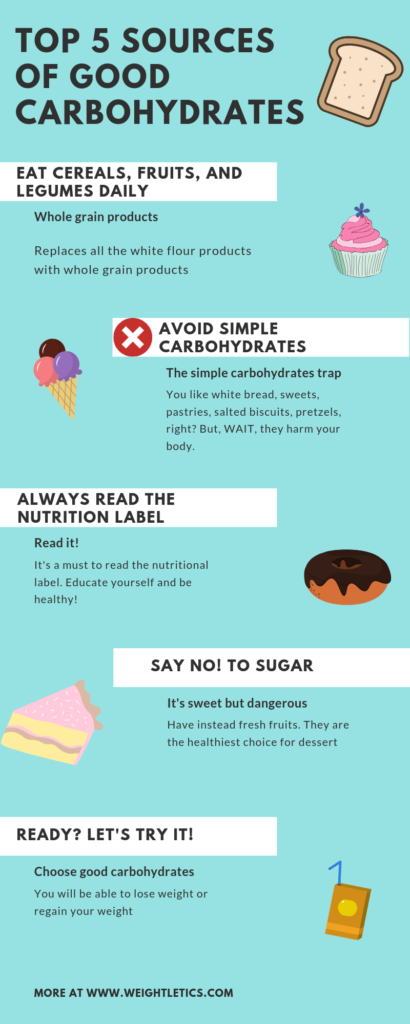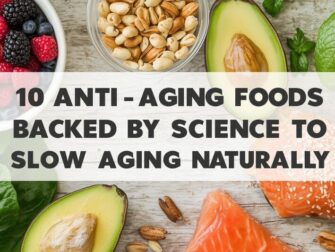I’m pretty sure that you heard and read about carbohydrates which are the fuel of each human body, including yours. I assume that you also know about the kinds of carbs which exist. But you have to choose the quality ones for your body and for your health. Do you know how to choose them? Let me tell you the truth about carbohydrates, and the chances are, it’s not what you think it is. There are two main groups, but let’s see together the good carbohydrates ones, the carbs which provide you vitamins and minerals.
What Are The Carbohydrates?
There is no brainer here; they are glucides and sugar. The sugars are the primary source of energy of our body, which should provide the 50% or more of the daily calories’ intake. We talk here about the quality of the intake, which creates the two main groups as good and bad carbohydrates. The differences between these two are visible regular weight and overweight, the difference between healthy and disease. It’s essential to know which is the good group and how to choose them to give all the benefits to our bodies.
The Good And The Bad – Do I Need Carbohydrates?
Depending on their composition and impact on blood sugar, carbohydrates are classified as simple (simple sugars or refined carbohydrates) and complex carbohydrates.
The two types of carbohydrates affect blood sugar levels (blood sugar) differently and also have a different impact on both the hunger sensation (by rapid or slow triggering of insulin secretion from the pancreas) and the production and energy storage in the body.
Complex carbohydrates (or glucides or slow-release sugars) are good for the body, because of their high quality of being absorbed much slower than the simple ones and provide the body with constant energy throughout the day, preventing sudden increases and decreases in blood sugar and offers a feeling of prolonging satiety. The primary sources are whole grains and legumes.
Simple carbohydrates, beneficial for the human body were once complex carbohydrates, but human intervention removed from the dietary fiber, vitamins and minerals and thus the only remaining were glucides or “bad” sugars, which our body absorbs quickly and which are very easily deposited in the form of fat, it causes sudden increases and decreases in blood sugar, thus negatively influencing appetite meaning that they can increase the feeling of starvation.
The primary sources of simple carbs are refined sugar (and all the foods that contains it in large quantities) and white flour found in processed foods, pastries, jams, sweets, syrups, carbonated drinks.
The glycemic index is nothing more than a way to make the difference between good and bad carbohydrates, which is a way to classify foods based on their impact on blood sugar, meaning blood sugar levels. It is a way to make the difference between the “bad” fuel, which burns quickly, and the “good” one, which burns slowly and offers constant energy. The lower the glycemic index, the slower it becomes energy, and the impact on the glucose level is reduced.
General Rules On How To Choose The Good Carbohydrates
As far as noticed and experienced in my diet, there are 4 general rules.
1. Eat at least 6 servings of cereals, fruits, and legumes daily
This rule means you consume at least 2 fruits and 4 servings of legumes or whole grains per day, but preferably no later than 6 pm, if you have problems with blood sugar, triglycerides, if you have fatty liver or have issues with weight. This is because if there are too many carbohydrates in the diet and are consumed, especially in the second part of the day when they inevitably lead to weight gaining and subsequently to metabolic problems. Limiting carbohydrates in your diet to 50% of your daily calorie count is a first step toward balancing your diet, but this percentage may be even lower in case you follow a weight loss diet.
Your day should start with breakfast in which you should include the highest number of carbohydrates, gradually decrease at lunch, and at dinner, it is preferable to be reduced to the maximum. In the evening, that is after 6pm, especially if you need to lose weight, I advise you to consume predominantly low protein foods such as lean meat, grilled fish, low fat cheeses and a smaller number of carbohydrates from vegetables with low glucides such as tomatoes, cucumbers, peppers, cabbage, eggplant, zucchini, mushrooms, green beans or green vegetables.
If you suffer from any disease, ask your doctor before implementing these changes in your lifestyle! Keeping a food diary, it’s a smart way to control your intake and also discuss with your physician how you can adjust your diet without endangering your health.
2. Eliminate simple carbohydrates from your diet!
Products that contain large amounts of simple carbohydrates (white bread, sweets, pastries, salted biscuits, pretzels) should be eliminated entirely from any diet, not just the weight loss diet or the diabetic diet.
3. Always read the nutrition label
Many products contain more sugar or more bad carbohydrates than you think. Nutrition labels are an easy way to find the source of simple carbohydrates you want to avoid. Sucrose is the chemical name for sugar, but you should avoid all products that include fructose (corn syrup), dextrose, and maltose. The higher they are in the list of ingredients, the more “bad” and not recommended is the product.
Look very carefully at the “total carbohydrates” expressed in grams on the food label. It can be broken down into “dietary fiber” and “sugars,” which include natural sugars from fruits and milk, as well as added sugars. When you check the nutritional label of foodstuff, and if the list contains a form of sugar as the first ingredient, it means that the food has a high number of total sugars. A point of attraction when you go shopping is the juices’ department, right? Try to avoid it! Juices often include added sugars in astonishing quantities. Next time when you are in a supermarket, check the nutritional label of cola, you’ll have a surprise.
4. Replace sugar with low-calorie sweeteners
It is known that sugar is the most dangerous source of simple carbohydrates, it steals calcium and vitamins from the body, increases appetite, creates addiction, and you gain weight, it is worth eliminating and replacing with healthier choices.
Sources Of Good Carbohydrates
1. Bread and whole grain products
Replaces all the white flour products – pasta, white bread, sweet cereals existing in your diet with their integral variants – whole pasta, whole bread, whole grains. You will thus benefit from all the fibers, vitamins, and minerals hidden in the grain shell, which has been eliminated to obtain white bread and derivatives. In addition, the feeling of satiety after consuming them is longer lasting, and the impact on blood sugar is much lower.
2. Legumes
They are a separate category of complex carbohydrates, is scientifically proven to protect the heart and arteries, lower cholesterol and prolong your life. Whether you opt for white or black beans, peas or colored lentils, you benefit from plenty of minerals, fibers, and vitamins, as well as high-quality proteins. Consume at least one serving of legumes (100 g cooked) daily, either in the form of soup, spreadable pasta or as simple.
3. Vegetables
They are the most abundant source of antioxidants, but also of good fiber and carbohydrates, which gives you sustainable energy. From green vegetables (cabbage, cauliflower, spinach, nettles, green salad, parsley, etc.) and red (peppers, tomatoes, etc.) to yellow ones (carrot, pumpkin, etc.), violet (red cabbage, beetroot, eggplant). In your plate should always be one of each color as a guarantee of iron health.
4. Brown rice
As in the case of wheat from which white bread is made, white rice is peeled rice, deprived of the most important nutrients. Brown rice is whole-grain rice, an excellent source of complex carbohydrates, although the cooking time is double the white rice. Along with a generous salad of fresh white cabbage with dill or mushrooms and grilled zucchini, it can make an excellent, satisfying, healthy lunch that helps you lose weight. I personally like the black rice.
5. Fresh fruits
Fresh fruits are a very healthy choice, as they are nutrient-rich packages of fiber (which slows down the absorption of concentrated sugars), vitamins and minerals, directly responsible for the health and proper functioning of your body at any time. Don’t forget that fresh fruits remain the healthiest choice for dessert, in any diet!
Conclusion
Carbohydrates are essential nutrients that provide you with energy and should account for at least half of the calories’ in your daily diet, but their quality matters for the silhouette as well as for health. The good ones from whole grains, legumes, fresh vegetables, and fruits are the healthiest sources of energy. In addition, by replacing simple with complex carbohydrates in your diet, you will be able to lose weight, without starving yourself, or regain your health!



